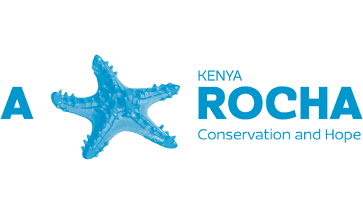Farming God’s way
A Rocha Kenya’s ecosystem-based “Farming God’s Way” is a tool for everyone with a patch of ground to plant and grow food in a way that responds to God’s call to take care of His creation. Modelled on a more widely known farming method called ‘Conservation Agriculture’, Farming God’s Way (FGW) looks to replicate on our farms how ‘God farms his farm’ – i.e. a forest. Any farmer will tell you how the soil in a field where the forest has recently been cleared from it is more fertile and productive than a field that has been farmed for several years. FGW seeks to bring back principles found in a natural forest ecosystem that allows the soil to not just retain fertility but even increase over time.

Taking the three basic principles of Conservation Agriculture of zero tillage, mulching and rotation of crops, and building on these using biblical principles that are also relevant to all walks of life, FGW becomes a tool that is now being widely used across Africa and is producing remarkable results. If you think about it, in a forest there is no disturbance of the soil (= zero tillage), a thick layer of dead leaves etc on the soil surface (= mulching) and amazing diversity of species (= rotation of crops). God, as the ‘first farmer’ in the Garden of Eden, brings additional principles to the way we should farm – e.g. farming on time: in creation, we see incredible timing that God has put there – from the daily rhythm of day and night and all the associated biorhythms of insects, flowers, birds and animals, to the seasons and the Infinitesimal precision of the rotation of the planets around the sun… etc etc. This means that when farming, we need to take special note of planting on time, weeding in good time etc – in fact those teaching FGW across Africa say the single largest reason for hunger in Africa is farmers wait for the rain to come before they plant… thus planting late.
So, A Rocha is taking this and several other biblical principles and applying them within the FGW teaching to train and empower community members living in often real hardship conditions to be able to obtain better productivity from their farms and in so doing learn to respect and care for the rest of God’s creation around them.
A Rocha, therefore, sees FGW as an innovation that not only focuses on increased food production but also addresses issues of biodiversity conservation. We look to include within the FGW training teaching about planting indigenous trees, leaving part of your land fallow for other parts of God’s creation to flourish in such as butterflies, other insects, flowers, birds and animals and the value of biodiversity not only for agriculture (e.g. pollinators) but in itself as God’s creation which he made with a purpose and which ultimately belongs to him.
In Kenya, A Rocha has worked with communities in several parts of the country with projects in Nairobi, Kajiado and Kilifi Counties. Currently, our focus is in the Dakatcha Woodlands north and inland of Malindi, and around Arabuko-Sokoke Forest. Training involves taking time through churches to teach about what the bible says regarding caring for the environment after which a two-day training in the actual FGW method is carried out. This covers the following topics:
- The Biblical perspective of farming and creation care.
- Ecological Interactions (Trees, birds, butterflies, ants, worms and their role in the farm)
- Principles and practice of Farming God’s Way
- Natural ways of controlling pests and diseases
- Natural ways of boosting soil fertility including composting, liquid fertilizers, fertilizer trees among others.
- Energy-saving at the household level
The focus in Dakatcha revolves around the A Rocha Dakatc ha Nature Reserve which we are creating to protect globally threatened species and habitat – in particular the Sokoke Scops Owl and Golden-rumped Sengi (also known as an elephant-shrew). Baseline biodiversity surveys are being carried out by the A Rocha research team while at the same time our community and environmental education team are working with the adjacent communities using the churches and schools as a gateway to reach farmers and families to teach them FGW and overall care for the environment and hopefully stop the destructive practices of charcoal burning and unsustainable logging for timber.
ha Nature Reserve which we are creating to protect globally threatened species and habitat – in particular the Sokoke Scops Owl and Golden-rumped Sengi (also known as an elephant-shrew). Baseline biodiversity surveys are being carried out by the A Rocha research team while at the same time our community and environmental education team are working with the adjacent communities using the churches and schools as a gateway to reach farmers and families to teach them FGW and overall care for the environment and hopefully stop the destructive practices of charcoal burning and unsustainable logging for timber.
